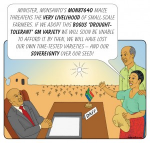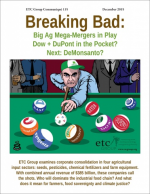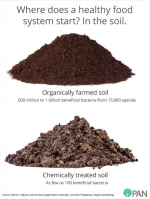22.12.2015 | permalink
Switzerland will extend moratorium on GM crop cultivation
Moratorium expected to remain in place until 2021
The Swiss Federal Council, meeting in Bern on 18 December 2015, has declared that it is in favour of continuing the country’s moratorium on the cultivation of GM plants until 2021.
The Federal Council said it ”has decided to maintain the ban on the cultivation of genetically modified organisms (GMOs). The current moratorium should be extended until 2021 under the Gene Technology Act (LGG)."
Currently, GMO cultivation is only permitted in Switzerland for research. The Swiss moratorium has been extended twice and expires in December 2017. Several cantons already have already indicated their interest in an extension of the moratorium and have adopted decisions to ban GM crops on their territory.
The Federal Council also asks that ”principles guaranteeing the protection of conventional crops as well as the free choice of consumers (coexistence) are specified.”
21.12.2015 | permalink
Yurok Tribe bans GMOs
YUROK COUNTRY – On December 10, 2015, after several months of committee drafting and opportunity for public comment, the Yurok Tribal Council unanimously voted to enact the Yurok Tribe Genetically Engineered Organism (“GEO”) Ordinance.
The Tribal GEO Ordinance prohibits the propagation, raising, growing, spawning, incubating, or releasing genetically engineered organisms (such as growing GMO crops or releasing genetically engineered salmon) within the Tribe’s territory and declares the Yurok Reservation to be a GMO-free zone. While other Tribes, such as the Dine’ (Navajo) Nation, have declared GMO-free zones by resolution, this ordinance appears to be the first of its kind in the nation.
19.12.2015 | permalink
WTO in Nairobi: Civil society expresses shock at draft agriculture text
Nairobi, 17 Dec (Ranja Sengupta) - Civil society representatives present at the WTO Ministerial Conference (MC10) have expressed deep shock and disappointment over a draft text on Agriculture released in the early hours of the morning here on the third day of the Conference.
The text was circulated by the Ministerial Facilitator on Agriculture (Lesotho) together with the Chair of the Committee on Agriculture in Special Session (Ambassador Vangelis Vitalis of New Zealand).
Civil society representatives, present at the Ministerial, expressed deep shock and disappointment over the text released today. The text has yielded nothing on the demands of developing countries, most civil society groups here felt.
Expressing deep disappointment over the text, Timothy Wise, Tufts University, USA, said, "The draft text on agriculture is a serious disappointment. It offers no progress on key deliverables demanded by developing countries - public stockholding and special safeguard for import surges - fails to even mention new disciplines on domestic subsidies, and in its one deliverable on export competition, the small progress on export subsidies is diluted by weak language on export credits and food aid, the two main instruments used by the US government to promote its exports. This text utterly fails to advance the development agenda."
18.12.2015 | permalink
Appeal against Monsanto´s controversial maize MON87460

South Africa is in the grip of the worst drought since 1992, with many parts of the country experiencing record temperatures and little to no rain. The maize and transport industries are currently planning for a worst-case scenario, where the continent’s largest maize producer – South Africa – may potentially need to import 4 million metric tons of maize due to the prolonged drought. It is against this backdrop that the South African government has granted approval to Monsanto for it to market its wholly inadequate and over-hyped ‘climate smart’ solution to drought– genetically modified (GM) drought tolerant maize, also known as ‘MON87460.’ The controversial maize was developed under the auspices of a Bill and Melinda Gates Foundation (BMGF) funded project called Water Efficient Maize for Africa (WEMA), currently operating in five African countries and aimed at ‘benefitting’ smallholder farmers.
The African Centre for Biodiversity (ACB) has consistently opposed MON87460 as unproven, unsafe and inappropriate for resource-poor smallholders. The organisation has formally appealed against its approval for commercial cultivation in South Africa. The Minister of Agriculture, Mr Senzeni Zokwana, has advised the ACB on the 15th December 2015 that he has established an Appeal Board to deal with this pivotal appeal next year.
- ACBio: APPEAL AGAINST MONSANTO’S BOGUS GM DROUGHT TOLERANT MAIZE HIGHLIGHTS NEED FOR URGENT AGRICULTURE TRANSITION
- Sabrina Nafisa, African Centre for Biodiversity: Profiting from the climate crisis, undermining resilience in Africa: Gates and Monsanto’s Water Efficient Maize
- Testbiotech comment on GM drought tolerant maize MON 87460
- Biosafety Scanner: Maize MON87460 GM EVENT AND DETECTION METHODS
16.12.2015 | permalink
Breaking Bad: Big Ag Mega-Mergers in Play Dow + Dupont in the Pocket? Next: DeMonsanto?

December 2015. In this new report, ETC Group examines corporate consolidation in four agricultural input sectors: seeds, pesticides, chemical fertilizers and farm equipment. With combined annual revenue of $385 billion, these companies call the shots. Who will dominate the industrial food chain? And what does it mean for farmers, food sovereignty and climate justice?
Issue
The Big Six agrochemical corporations (BASF, Bayer, Dow, DuPont, Monsanto, Syngenta) that dominate commercial seed and pesticide markets worldwide now insist they must get bigger, faster if the world wants food security in the midst of climate chaos. According to agribusiness, the extreme pressures of population, demand for meat, and climate crisis require Big Science and Big Money – and that means extreme Mergers all along the industrial food chain.
- ETC Group: Breaking Bad: Big Ag Mega-Mergers in Play
- Capital Press: Dow-Dupont merger’s impact on competition may draw scrutiny
- Bloomberg Business: ChemChina Chairman Said to Meet With Syngenta in Bid Talks
- Reuters: Dow, DuPont set $130 billion megamerger, could spark more deals
- ETC Group: Global Agribusiness Mergers NOT a Done Deal
10.12.2015 | permalink
Organics only bright spot for German farmers
Germany's farmers are having a tough time, with farm-gate prices for their produce in a radical slump. Organic produce and wine-growing are the only bright spots in an otherwise difficult agribusiness environment.
Over the past year, German farmers have experienced the dark side of global markets, as farm-gate prices for their products have crashed, with a global oversupply facing weakened demand.
One major factor was that Russia imposed an embargo on imports of European Union food products in August 2014. It was Moscow's tit-for-tat response to EU economic sanctions against Russia, imposed in connection with the geopolitical competition for influence over Ukraine.
Another factor was that the EU dropped its system of dairy quotas in April of this year - leaving European dairy farmers fully exposed to the vagaries of global supply and demand. It's a move they may have cause to regret.
09.12.2015 | permalink
Philippines' Supreme Court permanently stops field trials of Bt eggplant
MANILA - Field testing for genetically modified eggplant, also known as Bt (Bacillus thuringiensis) talong, has been permanently stopped by the Supreme Court (SC), while applications for the contained use, field testing, propagation, commercialization, and importation of genetically modified organisms (GMOs) have been temporarily halted.
On their last regular en banc session for the year on Tuesday, high court magistrates upheld the Court of Appeals (CA) in permanently stopping field trials for Bt talong.
The CA ruled that existing regulations by the Department of Agriculture (DA) and the Department of Science and Technology (DOST) are "insufficient to guarantee the safety of the environment and the health of the people."
07.12.2015 | permalink
Patent on tomatoes about to be granted: New report shows the need for urgent political action
no patents on seeds
Press release
7 December 2015 Munich.
The European Patent Office (EPO) is granting more and more patents on conventional breeding. Now a final decision is about to be taken on a patent on tomatoes with reduced water content (EP1211926). Tomorrow, the EPO will have its final hearing on this patent, after which it will grant the patent with just some small changes to the wording. Together with a patent on broccoli (EP10698190), the patent on tomatoes has attracted major international attention and sparked intense debate over several years. At the end of March 2015, the EPO used these two cases to make a precedent decision in order to declare plants and animals derived from conventional breeding as patentable. There is currently growing opposition to this decision: Patent authorities and representatives of the governments of Austria, France, Germany and The Netherlands are amongst those who have publicly criticised the EPO decision.
“It is now up to politicians to show they can succeed in the fight against the well-organised interests of the patent business”, says Christoph Then, one of the speakers for the international coalition of “No Patents on Seeds!”. “The EPO, the patent attorneys and big corporations are all benefitting from these patents, but the negative consequences concern society as a whole. It is of the greatest importance that the existing prohibitions are properly implemented.”
05.12.2015 | permalink
Food at COP21: three new initiatives spotlight food insecurity, soils, waste

Food was high on the agenda at the Paris climate talks this week—here are some of the highlights
It’s become a catch-22 of our times: the global food system is both a villain and a victim of climate change. Agriculture accounts for almost a quarter of global greenhouse gas emissions, and yet floods, drought, and the planet’s increasing climatic variability play with the fate of our food. Continuing on the current climate trajectory will mean a future of profound food insecurity, especially for developing nations.
This week, these concerns have been prominent on the agenda at the COP21 climate talks in Paris. For the first time at a COP conference, agriculture had its own dedicated focus-day, held on Tuesday by the Lima-Paris Action Agenda (LPAA), a partnership established between France and Peru to showcase and strengthen on-the-ground climate action in 2015 and beyond.
- The Guardian: Food at COP21: three new initiatives spotlight food insecurity, soils, waste
- IFOAM: Make Soil a Solution to Climate Change!
- Greenpeace UK: In pictures: Soils and Climate Change on World Soil Day
- National Geographic: 14 Dirty Photos That Show Why Soil Matters
- Pesticide Action Network: Welcome to the "Year of Soils!"
- FAO: Our soils under threat
03.12.2015 | permalink
Tribunal Monsanto: The Hague –12th -16th of October 2016

For an increasing number of people from around the world, Monsanto today is the symbol of industrial agriculture. This chemical-intensive form of production pollutes the environment,
accelerates biodiversity loss, and massively contributes to global warming. Since the beginning of the twentieth century, Monsanto, a US-based company, has developed a number of highly toxic products, which have permanently damaged the environment and caused illness or death for thousands of people.
#TribunalMonsanto
PARIS, Dec. 3, 2015 The Organic Consumers Association (OCA), IFOAM International Organics, Navdanya, Regeneration International (RI), and Millions Against Monsanto, joined by dozens of global food, farming and environmental justice groups announced today that they will send Monsanto MON (NYSE), a US-based transnational corporation, to a tribunal for crimes against nature and humanity, and ecocide, in The Hague, Netherlands, next year on World Food Day, October 16, 2016.
The announcement was made at a press conference at the COP21 United Nations Conference on Climate Change in Paris.
- Monsanto-Tribunal
- Seed Freedom: International tribunal against Monsanto for crimes against humanity [Press Conference]
- Organic Consumers Association: Global Food, Farming and Environmental Justice Groups Send Monsanto to a Tribunal for... -- PARIS, Dec. 3, 2015
- Libération: Monsanto: Seed for justice
- Tribunal Monsanto - English version 031215



